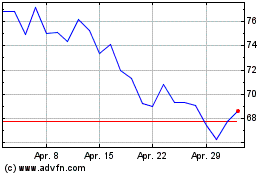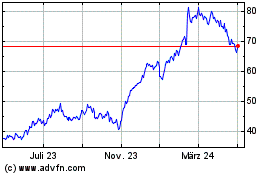By Nora Naughton
Rental-car companies, crushed by a collapse in bookings at the
onset of the Covid-19 pandemic, are now getting a lift from two
unexpected sources: rising used-car prices and more people looking
to travel by car.
When the new coronavirus outbreak hit the U.S. in force this
spring, the rental-car industry sustained a dual blow: a steep
drop-off in business as people and companies canceled travel plans
and a nosedive in resale values for their fleets. The drop-off in
used-car prices was particularly damaging for Hertz Global Holdings
Inc., helping to push the 102-year-old company into bankruptcy.
But over the summer, the industry's fortunes began to reverse.
Used-car prices snapped back and even hit record levels in August
as dealers grew tight on inventory. That market stabilization was
crucial for rental-car firms because they regularly turn over their
fleets and are sensitive to changes in resale values.
Customers, wary of air travel, rushed to rent vehicles for road
trips and business needs and as an alternative to using
ride-hailing apps operated by Uber Technologies Inc. and Lyft Inc.,
executives and analysts say.
These trends helped Avis Budget Group Inc. swing to a net profit
of $45 million in the third quarter, reversing losses in the first
half of the year, the company said Friday. Privately held
Enterprise Holdings Inc. also said it has benefited from an uptick
in leisure travel, with bookings improving over the summer and
customers renting vehicles for longer periods.
Both Avis and Enterprise say they plan to resume buying vehicles
to update their fleets after some downsizing earlier in the year, a
move that could bolster sales for car companies reliant on
rental-car firms for a portion of their business.
Hertz, still in bankruptcy and recently delisted from the New
York Stock Exchange, this summer pointed to record used-car prices
as aiding efforts to whittle down the company's fleet to raise
cash.
"We're starting to see new usage cases for rental cars," said
Chris Woronka, an analyst for Deutsche Bank. "In big cities, people
are renting cars to get to work, and some companies are even paying
for that instead of public transportation. That just didn't exist
before."
While the outlook is improving, rental-car bookings are still
down compared with last year, and firms continue to cut costs to
offset the decline in revenue, executives say.
The car-rental firms' recovery illustrates how businesses are
quickly adapting to new routines and lifestyles created by the
health crisis and even finding unexpected opportunities in the way
people have changed their lives.
Before the outbreak, the rental-car industry was fending off
threats to its business, including a loss of customers to Uber,
Lyft and other ride-hailing firms. But now many Americans are
avoiding shared transportation in the midst of the health crisis,
creating an opening for the rental-car companies, Mr. Woronka said.
Ridership is slowly returning for Uber and Lyft but remains below
pre-pandemic levels, the companies have said.
Michelle James, a quality engineer for an automotive supplier in
Ohio, said that in June she started renting vehicles from
Enterprise for her business trips, driving to Alabama and Michigan
in recent weeks. Ms. James travels often for her job and said that
having her own space makes her feel safer than flying during the
pandemic.
"I would just rather be in a car by myself," she said.
Reservations for rental cars collapsed in the spring when
widespread lockdowns squashed the travel industry.
Avis said reservations fell 60% after travel restrictions were
issued in March, and the rental-car company implemented furloughs
and job cuts aiming to reverse losses. Avis also began aggressively
selling off a portion of its fleet this spring at depressed
prices.
Used-car values in April hit their lowest levels in history,
according to vehicle-auction operator Manheim Inc., denting the
value of daily-rental fleets and creating challenges with lenders.
For Hertz, plummeting used-car values meant it had to make
additional payments on its fleets to cover depreciation,
precipitating its fall into bankruptcy.
As the economy reopened this summer, people fleeing cities and
wanting personal transportation rushed to buy used vehicles, and
preowned prices surged, rising more than 30% from April to
September. That was well above typical seasonal fluctuations,
according to research firm J.D. Power.
"Rental-car companies suddenly were in a very ideal position,"
said Jonathan Banks, an automotive analyst with J.D. Power who
tracks vehicle valuations. "There was some initial worry that they
would flood the used-car market, but it ended up being a boon."
By June, reservations for rental cars began to rebound, and the
rise in resale values helped rental-car companies more profitably
downsize their fleets, executives and analysts say.
Avis executives credited the company's third-quarter net profit
in large part to the strength in the used-car market. The company
expects results will continue to improve through further
cost-cutting measures and as travelers continue to show a
preference for using autos to get around.
"We believe there may be meaningful pent-up travel demand from
those feeling cabin fever," Avis Chief Financial Officer Brian Choi
told investors Friday.
Enterprise also has benefited from recent customer shifts in
travel, largely because it has a more expansive network of
stand-alone stores and is less dependent on airport business.
Rather than sell down its fleet, it has quickly shifted more
vehicles to nonairport locations, where demand is stronger, said
Enterprise's operations chief, Dave Nestor, in an interview.
"In some of the markets that have historically depended on
public transportation for people to get to work, we have seen our
business spike," Mr. Nestor said. That hasn't led only to more
bookings but also customers renting cars for longer periods, he
said.
Write to Nora Naughton at nora.naughton@wsj.com
(END) Dow Jones Newswires
November 02, 2020 06:59 ET (11:59 GMT)
Copyright (c) 2020 Dow Jones & Company, Inc.
Uber Technologies (NYSE:UBER)
Historical Stock Chart
Von Mär 2024 bis Apr 2024

Uber Technologies (NYSE:UBER)
Historical Stock Chart
Von Apr 2023 bis Apr 2024
